12 aug 2014

Israeli army sources say pictures of a devastated Gaza neighborhood have been distributed among Israeli soldiers as a memento.
The photos, showing Gaza’s Shijaiyah district before and after Israel’s destructive attacks, were circulated among soldiers who were engaged in the aggression in the Palestinian coastal enclave.
On July 20, dozens of people lost their lives and many others injured in Israel’s brutal massacre of Palestinians in Gaza's eastern Shejaiya district.
Witnesses said bodies of Palestinian women and children were lying on the ground after Israel attacked the Shejaiyah neighborhood in Gaza, forcing thousands of panicked civilians to flee.
The Israeli army reportedly prevented ambulances and emergency services from reaching the area.
Satellite images provided by a United Nations training organization also showed the damage to buildings from Israeli airstrikes across Gaza. The images, snapped by the Pleiades satellite and published by the United Nations Institute for Training and Research, compared the way a northeastern section of Gaza looked on July 6 — two days before the start of Israel’s offensive — and on July 25.
This comes as a senior Israeli official says the ongoing indirect talks with Palestinian delegates in Cairo on a lasting truce have made no progress.
According to the unnamed official, gaps between the two sides are still very wide.
Meanwhile, Israeli Prime Minister Benjamin Netanyahu, who was expected to discuss the Cairo talks with his security aides on Tuesday, called off the session.
Israeli and Palestinian negotiators are to discuss Israel's blockade on Gaza. The lifting of the blockade has been one of the main Palestinian demands.
The Egyptian-mediated talks have entered their second day while a 72-hour truce, which started at 2100 GMT on Sunday, is in effect on the ground in Gaza.
Over 1,940 Palestinians, including 470 children, have lost their lives and nearly 10,000 have been wounded since the Israeli military unleashed fatal assaults on the densely-inhabited strip on July 8.
The photos, showing Gaza’s Shijaiyah district before and after Israel’s destructive attacks, were circulated among soldiers who were engaged in the aggression in the Palestinian coastal enclave.
On July 20, dozens of people lost their lives and many others injured in Israel’s brutal massacre of Palestinians in Gaza's eastern Shejaiya district.
Witnesses said bodies of Palestinian women and children were lying on the ground after Israel attacked the Shejaiyah neighborhood in Gaza, forcing thousands of panicked civilians to flee.
The Israeli army reportedly prevented ambulances and emergency services from reaching the area.
Satellite images provided by a United Nations training organization also showed the damage to buildings from Israeli airstrikes across Gaza. The images, snapped by the Pleiades satellite and published by the United Nations Institute for Training and Research, compared the way a northeastern section of Gaza looked on July 6 — two days before the start of Israel’s offensive — and on July 25.
This comes as a senior Israeli official says the ongoing indirect talks with Palestinian delegates in Cairo on a lasting truce have made no progress.
According to the unnamed official, gaps between the two sides are still very wide.
Meanwhile, Israeli Prime Minister Benjamin Netanyahu, who was expected to discuss the Cairo talks with his security aides on Tuesday, called off the session.
Israeli and Palestinian negotiators are to discuss Israel's blockade on Gaza. The lifting of the blockade has been one of the main Palestinian demands.
The Egyptian-mediated talks have entered their second day while a 72-hour truce, which started at 2100 GMT on Sunday, is in effect on the ground in Gaza.
Over 1,940 Palestinians, including 470 children, have lost their lives and nearly 10,000 have been wounded since the Israeli military unleashed fatal assaults on the densely-inhabited strip on July 8.

The brigades said last month that its fighters had captured an Israeli soldier during an operation in the eastern Gaza Strip.
Hamas' armed wing said Monday it was ready to unveil the fate of Israeli soldiers held by its fighters in return for a list of Israeli spies in the Gaza Strip and West Bank.
"We will unveil the fate of the captured soldiers if Israel gave us a list of its spies in the Gaza Strip and West Bank," a member of the Ezzeddin al-Qassam Brigades said in a press release cited by the Doha-based Al-Jazeera channel.
The brigades said last month that its fighters had captured an Israeli soldier during an operation in the eastern Gaza Strip.
Since July 7, Israel has pounded the coastal territory, killing at least 1943 Palestinians and injuring nearly 10,000 others.
Thousands of homes in Gaza have also been destroyed over the same period.
At least 64 Israeli soldiers, meanwhile, have been killed in battles with Palestinian fighters in the Gaza Strip, while three civilians have been killed by Palestinian rocket fire, according to Israeli figures.
Israel and Gaza-based Palestinian factions are currently observing a three-day ceasefire that started on Monday to coincide with indirect talks in Cairo aimed at reaching a durable ceasefire.
Hamas' armed wing said Monday it was ready to unveil the fate of Israeli soldiers held by its fighters in return for a list of Israeli spies in the Gaza Strip and West Bank.
"We will unveil the fate of the captured soldiers if Israel gave us a list of its spies in the Gaza Strip and West Bank," a member of the Ezzeddin al-Qassam Brigades said in a press release cited by the Doha-based Al-Jazeera channel.
The brigades said last month that its fighters had captured an Israeli soldier during an operation in the eastern Gaza Strip.
Since July 7, Israel has pounded the coastal territory, killing at least 1943 Palestinians and injuring nearly 10,000 others.
Thousands of homes in Gaza have also been destroyed over the same period.
At least 64 Israeli soldiers, meanwhile, have been killed in battles with Palestinian fighters in the Gaza Strip, while three civilians have been killed by Palestinian rocket fire, according to Israeli figures.
Israel and Gaza-based Palestinian factions are currently observing a three-day ceasefire that started on Monday to coincide with indirect talks in Cairo aimed at reaching a durable ceasefire.
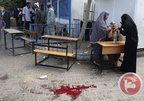
Palestinian lawyers in the Gaza Strip are “preparing to legally and internationally prosecute Israel” for its offensive on Gaza and targeting civilians.
Legal expert Abd al-Karim Shbeir said in a statement that the Israeli offensive against the Gaza Strip violated all international laws.
Shbeir added that Israel has used “prohibited weapons that violate international law.”
Shbeir held the international community was responsible for the “disastrous results of their silence and for giving the green light for killing and destroying Palestinians.”
Maher Bashir, chief of the Islamic Lawyer’s Union’s Syndicate, warned of committing more war crimes against Palestinians especially if the international community remains silent.
Bashir called upon the Arab League to act to stop the killing of civilians and destroying their homes.
Legal expert Abd al-Karim Shbeir said in a statement that the Israeli offensive against the Gaza Strip violated all international laws.
Shbeir added that Israel has used “prohibited weapons that violate international law.”
Shbeir held the international community was responsible for the “disastrous results of their silence and for giving the green light for killing and destroying Palestinians.”
Maher Bashir, chief of the Islamic Lawyer’s Union’s Syndicate, warned of committing more war crimes against Palestinians especially if the international community remains silent.
Bashir called upon the Arab League to act to stop the killing of civilians and destroying their homes.

By Fadwa Baroud AbedRabo
Third-year civil engineering student at Gaza University Mohammad Shamali tries to remember what happened moments before he was found under the wreckage.
“I was running from one place to another with my family looking for a safe place, when we finally took shelter in my aunt’s house. My mum and aunt were preparing the iftar a few minutes before sunset when I heard women, children, and men screaming."
Mohammad remembers the screams he heard just before he saw the ceiling falling down on top of him.
"For a second, I remembered the first lesson in civil engineering college where we were taught that ceilings should not fall down. But in Gaza, a place where nothing makes sense and where you start to doubt everything you have been taught, ceilings falling down easily and can end your life and the lives of your loved ones in seconds,” says the 21-year-old.
The Shajaiyeh neighborhood in Gaza is an area that had already been subjected to intense bombardment. The incident that Mohammad speaks of took place on July 20 when a marketplace was bombed during a supposed humanitarian ceasefire, which resulted in the death of dozens of civilians.
Mohammad wasn't aware that he spent a full day under the wreckage as ambulances were not able to reach the area due to heavy attacks.
Finally some locals decided to take the risk and look for survivors. Mohammad was counted with the dead bodies at first before he showed signs of life at the Shefaa Hospital.
“I was told that I spent ten days in the Shifa Hospital unconscious before the hospital was hit by Israeli airstrikes. After that I was transferred to Makased Hospital in Jerusalem with other severely wounded cases. Medics are not sure if I will walk again and I cannot feel my legs. I know nothing about the fate of my family, no news from Gaza yet. My body is here in Jerusalem, but my soul is still there in Gaza,” says Mohammad.
For 30 days images and stories of Palestinians trapped under the rubble like Mohammad have increased the concern of the international community about the protection of civilians, and the urgency of finding a final solution to the Israeli–Palestinian conflict.
Since the beginning of the current cycle of violence between Israel and Gaza close to 1,900 Palestinians have been killed, most of whom civilians and many of them children. Around 10,000 people have been injured and more than a quarter of the impoverished enclave's 1.8 million residents displaced. Palestinian sources believe there were more fatalities under the wreckage. On the Israeli side, there are currently three civilians dead.
Electricity in Gaza City is available only two hours a day, while large parts of the central Gaza Strip have no electricity at all. According to the Water and Sanitation cluster in Palestine 1.5 million people in Gaza, including the ones residing in displaced persons shelters, have restricted access to water or are without any water at all.
The United Nations has warned of a possible public health crisis in the Gaza Strip as a direct result of the ongoing conflict. UNICEF estimates that 326,000 minors in Gaza are in need of psychological help.
As the needs have risen the EU has allocated a new financial commitment of €5 million to support emergency operations to key humanitarian partners. This brings humanitarian funding made available through the European Commission's Humanitarian Aid and Civil Protection department to support the Palestinian population of Gaza to about €23.5 million in 2014.
The author is an ECHO communication assistant based in Jerusalem.
Third-year civil engineering student at Gaza University Mohammad Shamali tries to remember what happened moments before he was found under the wreckage.
“I was running from one place to another with my family looking for a safe place, when we finally took shelter in my aunt’s house. My mum and aunt were preparing the iftar a few minutes before sunset when I heard women, children, and men screaming."
Mohammad remembers the screams he heard just before he saw the ceiling falling down on top of him.
"For a second, I remembered the first lesson in civil engineering college where we were taught that ceilings should not fall down. But in Gaza, a place where nothing makes sense and where you start to doubt everything you have been taught, ceilings falling down easily and can end your life and the lives of your loved ones in seconds,” says the 21-year-old.
The Shajaiyeh neighborhood in Gaza is an area that had already been subjected to intense bombardment. The incident that Mohammad speaks of took place on July 20 when a marketplace was bombed during a supposed humanitarian ceasefire, which resulted in the death of dozens of civilians.
Mohammad wasn't aware that he spent a full day under the wreckage as ambulances were not able to reach the area due to heavy attacks.
Finally some locals decided to take the risk and look for survivors. Mohammad was counted with the dead bodies at first before he showed signs of life at the Shefaa Hospital.
“I was told that I spent ten days in the Shifa Hospital unconscious before the hospital was hit by Israeli airstrikes. After that I was transferred to Makased Hospital in Jerusalem with other severely wounded cases. Medics are not sure if I will walk again and I cannot feel my legs. I know nothing about the fate of my family, no news from Gaza yet. My body is here in Jerusalem, but my soul is still there in Gaza,” says Mohammad.
For 30 days images and stories of Palestinians trapped under the rubble like Mohammad have increased the concern of the international community about the protection of civilians, and the urgency of finding a final solution to the Israeli–Palestinian conflict.
Since the beginning of the current cycle of violence between Israel and Gaza close to 1,900 Palestinians have been killed, most of whom civilians and many of them children. Around 10,000 people have been injured and more than a quarter of the impoverished enclave's 1.8 million residents displaced. Palestinian sources believe there were more fatalities under the wreckage. On the Israeli side, there are currently three civilians dead.
Electricity in Gaza City is available only two hours a day, while large parts of the central Gaza Strip have no electricity at all. According to the Water and Sanitation cluster in Palestine 1.5 million people in Gaza, including the ones residing in displaced persons shelters, have restricted access to water or are without any water at all.
The United Nations has warned of a possible public health crisis in the Gaza Strip as a direct result of the ongoing conflict. UNICEF estimates that 326,000 minors in Gaza are in need of psychological help.
As the needs have risen the EU has allocated a new financial commitment of €5 million to support emergency operations to key humanitarian partners. This brings humanitarian funding made available through the European Commission's Humanitarian Aid and Civil Protection department to support the Palestinian population of Gaza to about €23.5 million in 2014.
The author is an ECHO communication assistant based in Jerusalem.
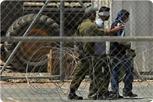
The Palestinian ministry of prisoners' affairs said on Tuesday that the Israeli occupation forces abused and severally beat Palestinian civilians they had detained during the military aggression against the Gaza Strip. Lawyer of the ministry Kareem Ajwa, who visited some prisoners in Ashkelon jail on Monday, said that Mo'men Annajar and Issa Annajar, both from Khuza'a town in Khan Younis, told him about their exposure to severe beating and humiliation at the hands of Israeli soldiers during their detention.
They explained that they were detained along with other young men on July 23 after the Israeli army bombed the town and sent troops to storm it and make arrests.
One day after their kidnapping, the two detainees along with others were transferred to an unknown place, probably a military post near Gaza borders, before they were taken on the following day to Ashkelon jail where they have been treated inhumanly by Israeli interrogators ever since, according to the lawyer.
Lawyer Ajwa said that the Israeli jailers extended the detention of Mo'men and Issa for seven days during a court trial held two days ago, adding that their families are barred from contacting or seeing them during the current period
They explained that they were detained along with other young men on July 23 after the Israeli army bombed the town and sent troops to storm it and make arrests.
One day after their kidnapping, the two detainees along with others were transferred to an unknown place, probably a military post near Gaza borders, before they were taken on the following day to Ashkelon jail where they have been treated inhumanly by Israeli interrogators ever since, according to the lawyer.
Lawyer Ajwa said that the Israeli jailers extended the detention of Mo'men and Issa for seven days during a court trial held two days ago, adding that their families are barred from contacting or seeing them during the current period

Palestinian Deputy Prime Minister Ziad Abu Amro arrived in Gaza on Tuesday in his first visit since the formation of a new unity government.
Abu Amro was accompanied by former minister Kamal al-Sharafi and entered via the Erez crossing.
The visit marks the first time Israel has allowed officials from the Palestinian unity government to enter Gaza through Erez since its formation.
Hamas and the PLO, dominated by Fatah, signed a surprise reconciliation agreement in April to end years of rivalry.
Abu Amro was accompanied by former minister Kamal al-Sharafi and entered via the Erez crossing.
The visit marks the first time Israel has allowed officials from the Palestinian unity government to enter Gaza through Erez since its formation.
Hamas and the PLO, dominated by Fatah, signed a surprise reconciliation agreement in April to end years of rivalry.
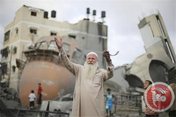
A three-member panel appointed by the UN Human Rights Council to investigate allegations of humanitarian law violations during Israel's Gaza assault will start working in the Gaza Strip next month.
Ibrahim Khreisha, Palestine’s representative at the UN, told Ma'an that William Schabas will be heading the panel along with Canadian international law professor and Doudou Diene of Senegal, the UN's former Special Rapporteur on contemporary forms of racism.
Another woman will be replacing British-Lebanese lawyer Amal Alamuddin, who has declined the UN's appointment.
“A team of seven to eight members will be assigned by the High Commissioner’s office to be working alongside with the panel,” Khreisha said.
Khreisha added that the international panel will enter Gaza through Egypt but that they will not be able to enter the West Bank or Jerusalem because Israel refused to cooperate with them.
He added: “There is an intention that Gazans' testimonies will be aired live, as in the Goldstone report.”
The panel will hear reports of Palestinian and international human rights institutions of “Israeli war crimes that occurred in the West Bank before the offensive on the Gaza Strip which started with detaining and killing more than 11 Palestinians, including the kidnapping, burning and killing of teen Muhammad Abu Khdeir,” Khreisha added.
“The escorting team will be investigating all humanitarian and international laws violations since June 13, 2014.”
The panel will submit a report by March 2015 to the Human Rights Council of the UN.
Some 1,945 Palestinians were killed in the Gaza Strip and 11 in the West Bank following the kidnapping of three Israeli settlers.
Ibrahim Khreisha, Palestine’s representative at the UN, told Ma'an that William Schabas will be heading the panel along with Canadian international law professor and Doudou Diene of Senegal, the UN's former Special Rapporteur on contemporary forms of racism.
Another woman will be replacing British-Lebanese lawyer Amal Alamuddin, who has declined the UN's appointment.
“A team of seven to eight members will be assigned by the High Commissioner’s office to be working alongside with the panel,” Khreisha said.
Khreisha added that the international panel will enter Gaza through Egypt but that they will not be able to enter the West Bank or Jerusalem because Israel refused to cooperate with them.
He added: “There is an intention that Gazans' testimonies will be aired live, as in the Goldstone report.”
The panel will hear reports of Palestinian and international human rights institutions of “Israeli war crimes that occurred in the West Bank before the offensive on the Gaza Strip which started with detaining and killing more than 11 Palestinians, including the kidnapping, burning and killing of teen Muhammad Abu Khdeir,” Khreisha added.
“The escorting team will be investigating all humanitarian and international laws violations since June 13, 2014.”
The panel will submit a report by March 2015 to the Human Rights Council of the UN.
Some 1,945 Palestinians were killed in the Gaza Strip and 11 in the West Bank following the kidnapping of three Israeli settlers.
|
|
The al-Mujahidin Brigades, the military wing of the al-Mujahidin Palestinian movement, published pictures of Israeli soldiers’ belongings they seized during the offensive on Gaza Strip on Tuesday.
The al-Mujahidin Brigades said they seized these belongings after the Beit Hanoun operation, where they clashed with soldiers with machine guns in the northern Gaza Strip. “Our fighters had a bloody war with the enemy, and they insist on winning the fight.” The brigades had earlier claimed responsibility for clashing with Israeli forces in eastern Beit Hanoun last Sunday. |

Ongoing ceasefire talks are slowly beginning to take shape, sources in Cairo told Ma'an, although several outstanding issues need to be finalized to produce a permanent agreement.
Palestinian sources close to the talks said Tuesday that six points have been agreed upon while a further five need to be resolved.
Israel has agreed to increase the daily number of truckloads of goods to Gaza from 250 to 600 via the Kerem Shalom and Nahal Oz crossings, the sources said.
Israel has also agreed to allow money transfers from the Palestinian Authority to Gaza to cover the salaries of former Hamas civil servants.
The designated fishing zone will also be gradually expanded to 12 nautical miles and some 500 permits will be issued monthly to allow Gazans to use the Erez crossing.
Egypt has agreed to open the Rafah crossing in coordination with PA presidential guards, who would form a 1000-strong presence on the crossing and borders with Gaza.
The sources said that Israel has also agreed to release the fourth and final group of pre-Oslo prisoners.
The remaining issues to be resolved are the infrastructural issues of an airport and seaport in Gaza. Israel suggested postponing the issue of an airport until final status negotiations, but said international actors should prepare plans for how a seaport would operate.
No progress has been made on the issue of demilitarization or a safe passage between the West Bank and Gaza.
The sources said that Israel also wanted to discuss the case of Israeli soldiers' remains being held by Hamas, but the Palestinian delegation argued that it should be addressed at a later date.
Israeli economy minister Naftali Bennet slammed news of progress in the talks, calling the transfer of salaries to former Hamas employees "dangerous," Israeli media reported.
Israel's offensive on Gaza has left nearly 2,000 Palestinians dead, the vast majority of them civilians, in addition to 67 people on the Israeli side, most of them soldiers.
Palestinian sources close to the talks said Tuesday that six points have been agreed upon while a further five need to be resolved.
Israel has agreed to increase the daily number of truckloads of goods to Gaza from 250 to 600 via the Kerem Shalom and Nahal Oz crossings, the sources said.
Israel has also agreed to allow money transfers from the Palestinian Authority to Gaza to cover the salaries of former Hamas civil servants.
The designated fishing zone will also be gradually expanded to 12 nautical miles and some 500 permits will be issued monthly to allow Gazans to use the Erez crossing.
Egypt has agreed to open the Rafah crossing in coordination with PA presidential guards, who would form a 1000-strong presence on the crossing and borders with Gaza.
The sources said that Israel has also agreed to release the fourth and final group of pre-Oslo prisoners.
The remaining issues to be resolved are the infrastructural issues of an airport and seaport in Gaza. Israel suggested postponing the issue of an airport until final status negotiations, but said international actors should prepare plans for how a seaport would operate.
No progress has been made on the issue of demilitarization or a safe passage between the West Bank and Gaza.
The sources said that Israel also wanted to discuss the case of Israeli soldiers' remains being held by Hamas, but the Palestinian delegation argued that it should be addressed at a later date.
Israeli economy minister Naftali Bennet slammed news of progress in the talks, calling the transfer of salaries to former Hamas employees "dangerous," Israeli media reported.
Israel's offensive on Gaza has left nearly 2,000 Palestinians dead, the vast majority of them civilians, in addition to 67 people on the Israeli side, most of them soldiers.
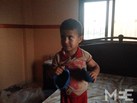
The blue plastic teddy bear bank belonging to his child, Mohammed, was broken open and coins looted by Israeli troops, he said
Hamas on Tuesday welcomed the UN decision to appoint a panel to investigate possible violations of humanitarian law during Israel's offensive on the Gaza Strip, a statement said.
Hamas spokesperson Sami Abu Zuhri said in a statement that Hamas welcomed the move, which he said would be a probe into Israeli "war crimes on Gaza."
The UN Human Rights Council on Monday appointed a three-member panel to look into possible humanitarian law violations throughout the assault.
Hamas on Tuesday welcomed the UN decision to appoint a panel to investigate possible violations of humanitarian law during Israel's offensive on the Gaza Strip, a statement said.
Hamas spokesperson Sami Abu Zuhri said in a statement that Hamas welcomed the move, which he said would be a probe into Israeli "war crimes on Gaza."
The UN Human Rights Council on Monday appointed a three-member panel to look into possible humanitarian law violations throughout the assault.
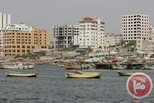
Israeli warships on Tuesday opened fire at fishermen off the coast of Rafah in the southern Gaza Strip, in an apparent violation of an agreed-upon three-day ceasefire, a union official said.
Nizar Ayyash, spokesman for Gaza's fishermen union, told Ma'an that a number of Palestinian fishermen were near the shore when Israeli forces shot at them with machine guns.
No injuries were reported.
Ayyash said Israeli naval forces had been preventing fishermen from fishing in the area, even within the "authorized fishing zone."
An Israeli army spokeswoman did not immediately return calls seeking comment.
A 72-hour ceasefire between Israeli forces and Palestinian factions was set in place at midnight Monday.
Israeli forces frequently shoot at Gazan fisherman if they stray further than three nautical miles from the shore.
Palestinian factions have demanded that Israel lighten restrictions on fishermen as a part of a lasting agreement to end hostilities in Gaza.
Israel's month-long offensive on Gaza has left nearly 2,000 Palestinians dead, the vast majority of them civilians, in addition to 67 people on the Israeli side, most of them soldiers.
Nizar Ayyash, spokesman for Gaza's fishermen union, told Ma'an that a number of Palestinian fishermen were near the shore when Israeli forces shot at them with machine guns.
No injuries were reported.
Ayyash said Israeli naval forces had been preventing fishermen from fishing in the area, even within the "authorized fishing zone."
An Israeli army spokeswoman did not immediately return calls seeking comment.
A 72-hour ceasefire between Israeli forces and Palestinian factions was set in place at midnight Monday.
Israeli forces frequently shoot at Gazan fisherman if they stray further than three nautical miles from the shore.
Palestinian factions have demanded that Israel lighten restrictions on fishermen as a part of a lasting agreement to end hostilities in Gaza.
Israel's month-long offensive on Gaza has left nearly 2,000 Palestinians dead, the vast majority of them civilians, in addition to 67 people on the Israeli side, most of them soldiers.

A nine-hour session of indirect negotiations between the Palestinian and Israeli delegations in Cairo on Monday ended with a partial draft agreement on easing the blockade on Gaza, sources close to the talks told Ma'an.
Negotiations for a lasting end to hostilities in the Gaza Strip are to resume at noon on Tuesday, the sources said.
Meanwhile, some of the terms of the draft agreement were reported by Israeli media. According to Channel 2, Palestinian factions, the Egyptian mediators, and the Israeli delegation have agreed on six terms so far:
1. Allowing Gaza fishermen to fish 12 nautical miles from shore.
2. Increasing the daily number of trucks importing goods to Gaza to 250.
3. Increasing the monthly number of permits granted to Gazans to pass through Erez crossing to 500.
4. Allowing money to be transferred from the West Bank to Gaza via the Palestinian Authority.
5. Opening the Rafah crossing with Egypt.
6. Freeing prisoners who were rearrested after being released in the Gilad Shalit exchange.
Additionally, the Israeli news site Ynet said that Israel had agreed to allow construction materials to enter Gaza "under close supervision."
Ynet also quoted an anonymous Israeli political source as saying Israel would not allow the construction of a seaport unless Hamas and other factions in Gaza agreed to demilitarize.
In order to reach a lasting end to hostilities in Gaza, Palestinians have demanded Israel end its eight-year siege on the Strip, release dozens of prisoners whom Israel has re-arrested that were released in 2011 as part of the Shalit deal, re-open a seaport and airport in Gaza, and create a safe passage between the West Bank and the Gaza Strip.
Israeli demands have centered around the demilitarization of Gaza factions and a return to "quiet" for Israel's civilians -- meaning a halt to rocket fire.
Israel's offensive on Gaza has left nearly 2,000 Palestinians dead, the vast majority of them civilians, in addition to 67 people on the Israeli side, most of them soldiers.
Negotiations for a lasting end to hostilities in the Gaza Strip are to resume at noon on Tuesday, the sources said.
Meanwhile, some of the terms of the draft agreement were reported by Israeli media. According to Channel 2, Palestinian factions, the Egyptian mediators, and the Israeli delegation have agreed on six terms so far:
1. Allowing Gaza fishermen to fish 12 nautical miles from shore.
2. Increasing the daily number of trucks importing goods to Gaza to 250.
3. Increasing the monthly number of permits granted to Gazans to pass through Erez crossing to 500.
4. Allowing money to be transferred from the West Bank to Gaza via the Palestinian Authority.
5. Opening the Rafah crossing with Egypt.
6. Freeing prisoners who were rearrested after being released in the Gilad Shalit exchange.
Additionally, the Israeli news site Ynet said that Israel had agreed to allow construction materials to enter Gaza "under close supervision."
Ynet also quoted an anonymous Israeli political source as saying Israel would not allow the construction of a seaport unless Hamas and other factions in Gaza agreed to demilitarize.
In order to reach a lasting end to hostilities in Gaza, Palestinians have demanded Israel end its eight-year siege on the Strip, release dozens of prisoners whom Israel has re-arrested that were released in 2011 as part of the Shalit deal, re-open a seaport and airport in Gaza, and create a safe passage between the West Bank and the Gaza Strip.
Israeli demands have centered around the demilitarization of Gaza factions and a return to "quiet" for Israel's civilians -- meaning a halt to rocket fire.
Israel's offensive on Gaza has left nearly 2,000 Palestinians dead, the vast majority of them civilians, in addition to 67 people on the Israeli side, most of them soldiers.

With thousands of homes reduced to rubble and its infrastructure in ruins, Gaza's reconstruction will cost billions and require at least an easing of Israel's blockade to allow in building materials.
Cement will be key among these materials, but its import will be controversial since it has been at the heart of an underground war between Israel and militants in Gaza.
From Beit Lahiya in the north, to Rafah in the south, Israel's latest offensive has left swathes of the Gaza Strip in ruins.
Families come during brief lulls in the fighting to sift through the debris of their homes for possessions, waiting to start rebuilding their lives.
In front of his apartment -- reduced to a grey mass of dust, rubble and twisted iron -- Jamal Abed drags on a cigarette as he thumbs his prayer beads.
"They destroyed everything here, there's nothing we can do," he says.
He knows he could spend months, even years, without somewhere to live because his home will have to be completely levelled before it can be rebuilt.
But for reconstruction to start, there has to be a negotiated end to the fighting.
There also has to be cement, lots of it, and the Palestinian enclave is suffering a chronic shortage of this crucial construction material.
Israel first imposed a blockade on Gaza in summer 2006 after militants in the territory seized one of its soldiers in a cross-border tunnel attack.
It was significantly tightened a year later after the Islamist movement Hamas seized control of the enclave, with Israel imposing severe restrictions on the entry of cement, gravel and steel.
Israel said the restrictions were aimed at stopping Islamist militants from building bunkers and other fortifications.
'100 years to rebuild'
James Rawley, the UN’s resident and humanitarian coordinator has warned that failure to lift the blockade could cause more conflict in Gaza in the future.
If the measures are not removed, "not only will we see very little in the way of reconstruction, but I am afraid that the conditions are in place for us to have another round of violence like we're seeing now," he told AFP on Sunday.
In 2010, Israel eased restrictions on imports of food and construction materials after international outrage over a botched Israeli raid on a Gaza-bound flotilla trying to break the blockade left 10 Turkish activists dead.
Since Hamas took power in 2007, Israel has launched two major offensives on Gaza: the 22-day Operation Cast Lead over New Year 2009, and the eight-day Operation Pillar of Defense in November 2012.
Both caused widespread devastation to the battered enclave.
Gazans have been largely able to circumvent the restrictions of the blockade by importing cement through cross-border smuggling tunnels from Egypt.
But after the Egyptian military overthrew Hamas's Islamist ally, president Mohamed Morsi, in July 2013, the new regime of Abdel Fattah al-Sisi has cracked down on the tunnels, destroying over 1,600 of them and dealing a death blow to the smuggling industry.
Since then, Gaza's reconstruction has been dependent on the materials Israel has allowed in, with supplies only permitted for international construction projects.
"It would take 100 years to rebuild Gaza with the current rate of construction material being allowed in," said Sari Bashi, co-founder of Israeli NGO Gisha which campaigns for Palestinian freedom of movement and trade.
"In the years in which cement has been banned from entering Gaza, Israel did not manage to prevent tunnels from being dug," she said.
"It is a policy that is overwhelmingly harming civilians in Gaza with little to no security benefit for Israel."
Cementing the truce?
The UN estimates more than 11,800 homes have been destroyed or rendered uninhabitable, more than twice the number that were destroyed in Operation Cast Lead.
At the time, the international community pledged $4.5 billion to rebuild Gaza’s shattered infrastructure.
This time round, the Palestinians say they need up to $6 billion to fix hospitals, roads, schools, water facilities and factories hit by shelling and bombing.
Mahir al-Tabaa, head of Gaza's chamber of industry and commerce, says that "more than 350 industrial buildings" have been destroyed in the fighting, including 50 key factories.
But the conflict which began on July 8 is not yet over.
The warring sides have both agreed to hold their fire for three days to allow Israeli and Palestinian negotiators to meet in Cairo for talks on a more durable end to the fighting.
The issue of cement is set to be one of the key challenges for the two sides as they struggle to reach an agreement.
Israeli officials have recognized the importance of rebuilding Gaza but they do not want to lift the blockade -- the main demand of the Palestinians.
"There will be no agreement without the blockade being lifted, without cement entering Gaza," said Daifallah al-Akhras, a senior Palestinian official.
"How do you expect us to rebuild without cement?"
Cement will be key among these materials, but its import will be controversial since it has been at the heart of an underground war between Israel and militants in Gaza.
From Beit Lahiya in the north, to Rafah in the south, Israel's latest offensive has left swathes of the Gaza Strip in ruins.
Families come during brief lulls in the fighting to sift through the debris of their homes for possessions, waiting to start rebuilding their lives.
In front of his apartment -- reduced to a grey mass of dust, rubble and twisted iron -- Jamal Abed drags on a cigarette as he thumbs his prayer beads.
"They destroyed everything here, there's nothing we can do," he says.
He knows he could spend months, even years, without somewhere to live because his home will have to be completely levelled before it can be rebuilt.
But for reconstruction to start, there has to be a negotiated end to the fighting.
There also has to be cement, lots of it, and the Palestinian enclave is suffering a chronic shortage of this crucial construction material.
Israel first imposed a blockade on Gaza in summer 2006 after militants in the territory seized one of its soldiers in a cross-border tunnel attack.
It was significantly tightened a year later after the Islamist movement Hamas seized control of the enclave, with Israel imposing severe restrictions on the entry of cement, gravel and steel.
Israel said the restrictions were aimed at stopping Islamist militants from building bunkers and other fortifications.
'100 years to rebuild'
James Rawley, the UN’s resident and humanitarian coordinator has warned that failure to lift the blockade could cause more conflict in Gaza in the future.
If the measures are not removed, "not only will we see very little in the way of reconstruction, but I am afraid that the conditions are in place for us to have another round of violence like we're seeing now," he told AFP on Sunday.
In 2010, Israel eased restrictions on imports of food and construction materials after international outrage over a botched Israeli raid on a Gaza-bound flotilla trying to break the blockade left 10 Turkish activists dead.
Since Hamas took power in 2007, Israel has launched two major offensives on Gaza: the 22-day Operation Cast Lead over New Year 2009, and the eight-day Operation Pillar of Defense in November 2012.
Both caused widespread devastation to the battered enclave.
Gazans have been largely able to circumvent the restrictions of the blockade by importing cement through cross-border smuggling tunnels from Egypt.
But after the Egyptian military overthrew Hamas's Islamist ally, president Mohamed Morsi, in July 2013, the new regime of Abdel Fattah al-Sisi has cracked down on the tunnels, destroying over 1,600 of them and dealing a death blow to the smuggling industry.
Since then, Gaza's reconstruction has been dependent on the materials Israel has allowed in, with supplies only permitted for international construction projects.
"It would take 100 years to rebuild Gaza with the current rate of construction material being allowed in," said Sari Bashi, co-founder of Israeli NGO Gisha which campaigns for Palestinian freedom of movement and trade.
"In the years in which cement has been banned from entering Gaza, Israel did not manage to prevent tunnels from being dug," she said.
"It is a policy that is overwhelmingly harming civilians in Gaza with little to no security benefit for Israel."
Cementing the truce?
The UN estimates more than 11,800 homes have been destroyed or rendered uninhabitable, more than twice the number that were destroyed in Operation Cast Lead.
At the time, the international community pledged $4.5 billion to rebuild Gaza’s shattered infrastructure.
This time round, the Palestinians say they need up to $6 billion to fix hospitals, roads, schools, water facilities and factories hit by shelling and bombing.
Mahir al-Tabaa, head of Gaza's chamber of industry and commerce, says that "more than 350 industrial buildings" have been destroyed in the fighting, including 50 key factories.
But the conflict which began on July 8 is not yet over.
The warring sides have both agreed to hold their fire for three days to allow Israeli and Palestinian negotiators to meet in Cairo for talks on a more durable end to the fighting.
The issue of cement is set to be one of the key challenges for the two sides as they struggle to reach an agreement.
Israeli officials have recognized the importance of rebuilding Gaza but they do not want to lift the blockade -- the main demand of the Palestinians.
"There will be no agreement without the blockade being lifted, without cement entering Gaza," said Daifallah al-Akhras, a senior Palestinian official.
"How do you expect us to rebuild without cement?"
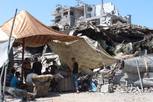
A semblance of normal life returned to Gaza on Monday as a 72-hour truce took hold and negotiators sat down in Cairo to seek a permanent end to hostilities.
Quiet returned to the enclave from midnight Sunday, the fruit of days of Egyptian-brokered mediation to stem violence which has killed 1,940 Palestinians and 67 on the Israeli side since July 8.
With no reports of violations on either side, shops and businesses started to reopen and people ventured onto the streets of the war-torn coastal enclave which is home to 1.8 million Palestinians.
Outside a UN-run school, a clutch of cars and donkey carts waited to take some refugees back to homes they had fled during the month of fighting.
"We want to go back to see what happened to our house," said Hikmat Atta, 58, who piled his family into a small cart to visit the home they left in the northern town of Beit Lahiya in the first days of the war.
But with the second truce in a week still in its early stages, he was not taking any chances.
"We're just going back for the day, at night we'll come back here," he told AFP.
Palestinian emergency services said that a one-month-old baby girl died on Monday of injuries sustained during the fighting, raising the overall death toll in Gaza to 1,940.
Shuttle diplomacy
In Cairo, Egyptian intelligence mediators threw themselves back into shuttle diplomacy that unravelled after rocket attacks breached the previous 72-hour truce on Friday.
They spent Monday locked in talks with the Palestinian delegation and were to relay their demands to Israeli negotiators, who returned to Cairo three days after abandoning the talks when Palestinian rocket attacks resumed on southern Israel.
Egypt has urged the warring sides to use the new lull to reach "a comprehensive and permanent ceasefire," after efforts to extend a similar truce last week collapsed into a firestorm of violence.
Israel insists that the security of millions of its citizens subject to constant fear from Palestinian rocket attacks be guaranteed.
Hamas has conditioned its acceptance of any permanent agreement on Israel lifting its eight-year blockade on Gaza.
"In the case of Israeli procrastination or continued aggression, Hamas is ready with other Palestinian factions to resist on the ground and politically," its exiled leader Khaled Meshaal told AFP in Doha.
And an Israeli cabinet minister warned that without a reasonable outcome to the talks, Israel would have to consider sending ground troops back into Gaza.
"Either there will be a reasonable resolution of the situation in Gaza, or, if the fire resumes, we will have to consider a broadening of the operation, including an expansion on the ground, overthrowing the Hamas authorities and the demilitarisation of Gaza by ourselves," Intelligence Minister Yuval Steinitz told army radio.
"No-one is very excited by this and there is a price for it. But I think that within a couple of days, it will be decided one way or another."
Gaza reconstruction
James Rawley, the top UN humanitarian official for the Palestinian territories, said Israel's security concerns must be addressed but warned that without ending the blockade another conflict was likely.
"Not only will we see very little in the way of reconstruction, but I am afraid that the conditions are in place for us to have another round of violence," he told AFP.
Palestinian delegates in Cairo said they would be happy for President Mahmoud Abbas's Palestinian Authority to take over the reconstruction of Gaza and execute any agreement reached in Cairo.
Israel has no direct dealings with Hamas, whose charter calls for its destruction.
Hamas had refused to extend the last 72-hour lull when it expired on Friday, and Israel accused the Islamist faction of breaching the agreement in its final hours with rocket attacks.
In the gap between ceasefires, warplanes hit more than 170 targets, killing at least 19 people, while the Palestinians fired at least 136 rockets at Israel, of which 93 hit and 13 were shot down, with the rest falling short inside Gaza, the army said.
The UN says just under three quarters of those killed in Gaza were civilians. Around a third of the civilian victims were children.
A Turkish aid group, the Humanitarian Relief Foundation, said it would send a new flotilla of ships in a bid to break Israel's eight-year blockade on Gaza.
Four years ago, the group sent a six-ship flotilla to Gaza which was stormed by Israeli commandos, leaving 10 Turkish nationals dead and triggering a major diplomatic crisis with Ankara.
Turkey has also promised to treat 200 wounded Palestinians from Gaza -- the first four of whom arrived in Ankara on Monday.
In the West Bank, a Palestinian militant was shot dead early Monday in an exchange of fire with Israeli troops near Nablus, witnesses and a Palestinian security source said.
The Israeli army, confirming the incident, said he was wanted in connection with a shooting incident against soldiers two weeks ago.
Quiet returned to the enclave from midnight Sunday, the fruit of days of Egyptian-brokered mediation to stem violence which has killed 1,940 Palestinians and 67 on the Israeli side since July 8.
With no reports of violations on either side, shops and businesses started to reopen and people ventured onto the streets of the war-torn coastal enclave which is home to 1.8 million Palestinians.
Outside a UN-run school, a clutch of cars and donkey carts waited to take some refugees back to homes they had fled during the month of fighting.
"We want to go back to see what happened to our house," said Hikmat Atta, 58, who piled his family into a small cart to visit the home they left in the northern town of Beit Lahiya in the first days of the war.
But with the second truce in a week still in its early stages, he was not taking any chances.
"We're just going back for the day, at night we'll come back here," he told AFP.
Palestinian emergency services said that a one-month-old baby girl died on Monday of injuries sustained during the fighting, raising the overall death toll in Gaza to 1,940.
Shuttle diplomacy
In Cairo, Egyptian intelligence mediators threw themselves back into shuttle diplomacy that unravelled after rocket attacks breached the previous 72-hour truce on Friday.
They spent Monday locked in talks with the Palestinian delegation and were to relay their demands to Israeli negotiators, who returned to Cairo three days after abandoning the talks when Palestinian rocket attacks resumed on southern Israel.
Egypt has urged the warring sides to use the new lull to reach "a comprehensive and permanent ceasefire," after efforts to extend a similar truce last week collapsed into a firestorm of violence.
Israel insists that the security of millions of its citizens subject to constant fear from Palestinian rocket attacks be guaranteed.
Hamas has conditioned its acceptance of any permanent agreement on Israel lifting its eight-year blockade on Gaza.
"In the case of Israeli procrastination or continued aggression, Hamas is ready with other Palestinian factions to resist on the ground and politically," its exiled leader Khaled Meshaal told AFP in Doha.
And an Israeli cabinet minister warned that without a reasonable outcome to the talks, Israel would have to consider sending ground troops back into Gaza.
"Either there will be a reasonable resolution of the situation in Gaza, or, if the fire resumes, we will have to consider a broadening of the operation, including an expansion on the ground, overthrowing the Hamas authorities and the demilitarisation of Gaza by ourselves," Intelligence Minister Yuval Steinitz told army radio.
"No-one is very excited by this and there is a price for it. But I think that within a couple of days, it will be decided one way or another."
Gaza reconstruction
James Rawley, the top UN humanitarian official for the Palestinian territories, said Israel's security concerns must be addressed but warned that without ending the blockade another conflict was likely.
"Not only will we see very little in the way of reconstruction, but I am afraid that the conditions are in place for us to have another round of violence," he told AFP.
Palestinian delegates in Cairo said they would be happy for President Mahmoud Abbas's Palestinian Authority to take over the reconstruction of Gaza and execute any agreement reached in Cairo.
Israel has no direct dealings with Hamas, whose charter calls for its destruction.
Hamas had refused to extend the last 72-hour lull when it expired on Friday, and Israel accused the Islamist faction of breaching the agreement in its final hours with rocket attacks.
In the gap between ceasefires, warplanes hit more than 170 targets, killing at least 19 people, while the Palestinians fired at least 136 rockets at Israel, of which 93 hit and 13 were shot down, with the rest falling short inside Gaza, the army said.
The UN says just under three quarters of those killed in Gaza were civilians. Around a third of the civilian victims were children.
A Turkish aid group, the Humanitarian Relief Foundation, said it would send a new flotilla of ships in a bid to break Israel's eight-year blockade on Gaza.
Four years ago, the group sent a six-ship flotilla to Gaza which was stormed by Israeli commandos, leaving 10 Turkish nationals dead and triggering a major diplomatic crisis with Ankara.
Turkey has also promised to treat 200 wounded Palestinians from Gaza -- the first four of whom arrived in Ankara on Monday.
In the West Bank, a Palestinian militant was shot dead early Monday in an exchange of fire with Israeli troops near Nablus, witnesses and a Palestinian security source said.
The Israeli army, confirming the incident, said he was wanted in connection with a shooting incident against soldiers two weeks ago.
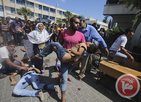
Some 141 public schools were damaged by the Israeli offensive on the Gaza Strip, according to the Gaza Ministry of Education on Monday.
The undersecretary of the Ministry of Education said that 22 schools were completely destroyed by the offensive and cannot be used for the upcoming school year.
Anwar al-Baraawi added that 119 schools were partially destroyed, and 25 schools were used as shelters.
“The damage will cost some $10.5 million to be repaired,” said al-Baraawi.
He added that 19 ministry employees were killed, and several others were injured, and thousands of students of different school levels were killed and injured during the Israeli offensive.
The assistant undersecretary of the ministry said that six universities were also damaged by the offensive.
The undersecretary of the Ministry of Education said that 22 schools were completely destroyed by the offensive and cannot be used for the upcoming school year.
Anwar al-Baraawi added that 119 schools were partially destroyed, and 25 schools were used as shelters.
“The damage will cost some $10.5 million to be repaired,” said al-Baraawi.
He added that 19 ministry employees were killed, and several others were injured, and thousands of students of different school levels were killed and injured during the Israeli offensive.
The assistant undersecretary of the ministry said that six universities were also damaged by the offensive.
Page: 104 - 103 - 102 - 101 - 100 - 99 - 98 - 97 - 96 - 95 - 94 - 93 - 92 - 91 - 90 - 89 - 88 - 87 - 86 - 85
Truce violations List of names Pictures of martyrs
Days: Aug: 26 - 25 - 24 - 23 - 22 - 21 - 20 - 19 - 18 - 17 - 16 - 15 - 14 - 13 - 12 - 11 - 10 - 9 - 8 - 7 - 6 - 5 - 4 - 3 - 2 - 1
July: 31 - 30 - 29 - 28 - 27 - 26 - 25 - 24 - 23 - 22 - 21 - 20 - 19 - 18 - 17 - 16 - 15 - 14 - 13 - 12 - 11 - 10 - 9 - 8
Days: Aug: 26 - 25 - 24 - 23 - 22 - 21 - 20 - 19 - 18 - 17 - 16 - 15 - 14 - 13 - 12 - 11 - 10 - 9 - 8 - 7 - 6 - 5 - 4 - 3 - 2 - 1
July: 31 - 30 - 29 - 28 - 27 - 26 - 25 - 24 - 23 - 22 - 21 - 20 - 19 - 18 - 17 - 16 - 15 - 14 - 13 - 12 - 11 - 10 - 9 - 8
